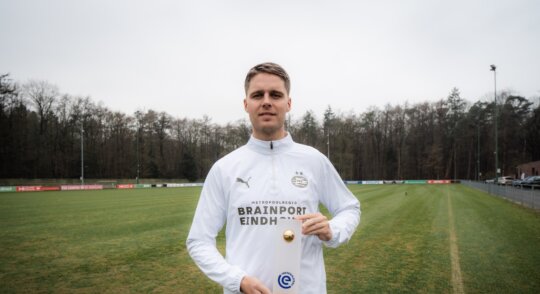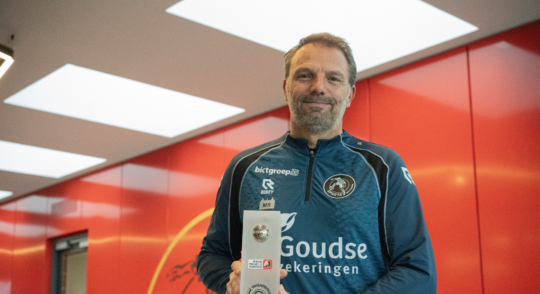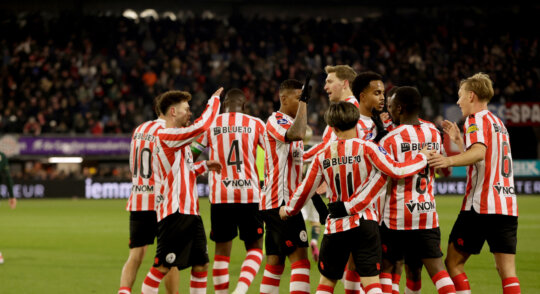Professional football is not ‘just a game’, but plays an important role in the lives of millions of people across the Netherlands. The extent of its impact on society has been identified by PwC. The main conclusions of this study, entitled ‘The social impact of professional football’ (only in Dutch available), are as follows:
- Professional football connects 8.2 million fans from all walks of life
- Professional football generates €2.03 billion for the Dutch economy
- Interest in professional football is huge. The average football fan dedicates 11 hours per week to it, which is 26% of their free time.
- Through CSR projects, professional football clubs help 283,299 people per year in health, work or education
- Professional football organisations (BVOs) play a corporate and social role in enabling connections in their region. In total, 12,557 corporate and social companies and organisations are active in professional football.
8.2 million football fans
In a society where people look for solidarity, professional football creates connections: between supporters on the stands and volunteers at the club. It also connects football fans in the workplace, at the pub, on social media and in the neighbourhood.
The Netherlands has 8.2 million fans of professional football, from people who watch the occasional match on television to season ticket holders who go to the stadium every week. Per round, millions of people watch the matches on the television and an average of 205,574 people are in the stadium.
An average of 11 hours per week
Whether it’s watching television, going to the stadium, or talking about football... over 8 million football fans spend an average of 11 hours per week on professional football, which accounts for 26% of their free time. By watching it on television (3.4 hours on average), visiting the stadium (1.7 hours), talking about it (1.5 hours), following it on social media (1.3 hours) and reading about it (1.1 hours), some superfans even reach 20 hours per week. Over 65% of them indicate that this positively contributes to their social network. For many, 'being part of something’ is an important part of their social life.
Platform for social issues
At a time when inclusiveness and diversity are important issues, professional football provides a platform for social discussions. In terms of diversity, professional football scores well on the pitch. Of the professional footballers, 31% are non-Dutch nationals or dual nationals. In total, they have 65 different nationalities. Many players are role models who ensure that young children from all corners of society pursue their dreams, try to live healthier lives and do their best at school.
Professional football clubs proactively help people progress in life. They do this through various social projects targeting participation, education, health and reintegration into the labour market. Professional football organisations help children with learning difficulties, people who are distanced from the labour market can be reintegrated through the club’s network and elderly people with dementia spend afternoons looking at old photos and reminiscing about times gone by. Currently, 283,299 participants take part in these events each year, which is double the number of participants who took part in 2015. Professional football has a direct impact on so many people’s lives.
Higher GDP contribution
The above figures highlight the positive impact of professional football on society and welfare, but what about the economic value? Researchers have calculated that the direct contribution to the Netherlands’ Gross Domestic Product (GDP) amounts to €2.03 billion. By comparison, this is 60% more than in 2015. This means the Dutch are now spending much more money on professional football, from choosing an ESPN subscription for live matches to ordering snacks and drinks at the bar. Professional football is also providing more and more employment opportunities, with clubs and their umbrella organisations accounting for 3,254 FTEs. Indirectly, this number is many times higher by the time all the camera operators, traffic controllers, catering staff etc. involved in football are factored in.
Value for the region
In addition to the direct impact, the report also highlights the indirect value, which is at least as important. Professional football clubs provide a platform for local and regional parties to connect and play a meaningful role. In total, 12,557 corporate and social companies and organisations are active in professional football. Through this network, people can get to know each other, do business and support each other.
Room for improvement
In recent years, great steps have been taken to increase the social impact of professional football. That provides extra motivation to keep going as there are still things that can be improved, such as diversity off the pitch. For example, only 5% of board members of professional football organisations are women. We also still have a long way to go in terms of sustainability, as only 36% of professional football clubs have a concrete sustainability policy.
The research
The research carried out by PwC was commissioned by the Royal Dutch Football Association (KNVB), the Eredivisie CV (ECV) and the Coöperatie Eerste Divisie (CED). Five years ago, PwC published a report entitled ‘The power of football’. The methodology developed back then has also largely been used in this research and supplemented with new information.
Social impact was assessed using five topics, which were selected because they are familiar to professional football organisations and align with a number of sustainable development goals set by the United Nations. The topics are connection, welfare, education, economy and sustainability.
The data for the research came from three sources: desk research (data from the ECV, the KNVB, the CED and public sources), a questionnaire sent out to professional football organisations and a representative survey among the Dutch population.
Read more







